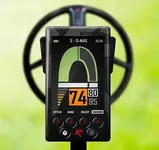I think that the primary issue for the screen on the Deus (and probably a number of other machines as well) is battery life. I'm honestly surprised that they squeeze as run time out of those tiny batteries as they do, and unlike machines that take battery packs or 9Vs, you can't just swap in new batteries when the Deus dies on you - it needs to be recharged. They've likely made a few compromises to maximize run time and the screen is almost certainly one of them. Those big LCD color screens on smart phones place obscene demands on batteries. And let's be honest here...it's black and white, but it works pretty well. The only time that I've ever had trouble reading mine is when I've smeared mud all over it or its cover, and a color screen wouldn't change that.
The manufacturers of detectors with easily-replaceable batteries have admittedly far less of an excuse for the practice - even less so when the black-and-white screen in question sucks even by black-and-white standards. Yes, I'm looking at you Minelab.

I'm not up to date on how Bluetooth would work for an application like this, hence whether or not a phone would work. I've read that Bluetooth is too slow for this, but I've also read that Bluetooth LE can have a latency down around 6 ms; when playing video games online, I'm extremely damned happy to get latency that fast and I simply can't understand why it would not work for listening to tones from a metal detector. Even assuming that the phone couldn't operate as a visual display, it could still function as a control box very easily, as latency would not matter. I'm curious about why this isn't being explored.
A big chunk of the Deus's cost likely comes from "brain redundancy" - the coil has a brain, the headphones have a brain, and the controller has a brain. This gives an owner some flexibility in how they want to run their machine, but it also drives up the price. Imagine for a moment if XP offered a phone app for accessing the programming functions that require the controller, and offered a pair of "dumb" wireless headphones that required no adapters or trickery to talk to the coil. The only unit with a brain would be the coil; everything else would be dumb.
Complete Telescopic Pole Assembly: $290 MSRP
11" Coil: $549 MSRP
Dumb Wireless Headphones: Varies. Let's call it $50.
Phone App: Free with detector purchase.
Charging Cable + Coil Clip: $54 MSRP.
$943 MSRP for a Deus Lite with access to the advanced menu. Street price would obviously be a C-note or two lower. That's only ("only") about $400 less than the standard Lite, but this has added functionality and the desirable 11" coil. More importantly, it now moved down into a new price bracket. Bonus points would be awarded if updates could be performed via the smart phone, eliminating the need for the special updating cable entirely. The only drawback would be the lack of a visual display, and an owner could always purchase one of those later if they thought that they really needed it. Perhaps a "dumb" version of the control box could be offered at lower cost, which was merely a screen with an on/off and backlight button - the smartphone would still handle all of the programming and settings. Or, perhaps Bluetooth would actually work for this, and then you could have a complete Deus for under $1000. At that price point, there would be no further discussion about what to buy. It would be a no-brainer, just as long as you owned a smart phone. And who doesn't?
But that's specifically for the Deus. What if the newer Bluetooth is fast enough for metal detecting? What if I simply sold coils (and maybe a frame or two, or you could supply your own frame) and an app, and your smart phone functioned as the brains of the machine? The mind boggles. Assuming that the code was tight and the coil was high quality, and that you had an old Bounty Hunter or Radioshack detector gathering dust in the closet, you could conceivably have a high end machine for a couple of hundred bucks. At that point, it wouldn't even make sense to buy starter machines anymore.
I don't know. I'm no expert and I'm probably missing something rather obvious. It just seems to me that everyone has a smart phone these days, and there's no reason why a smart phone couldn't shoulder at least the non-time-sensitive tasks that a control box traditionally performs, particularly if it can drive the price down on an otherwise expensive machine. Shifting as many device-specific functions onto another device that the owner already has just makes sense to me. But again, I'm not an expert.






